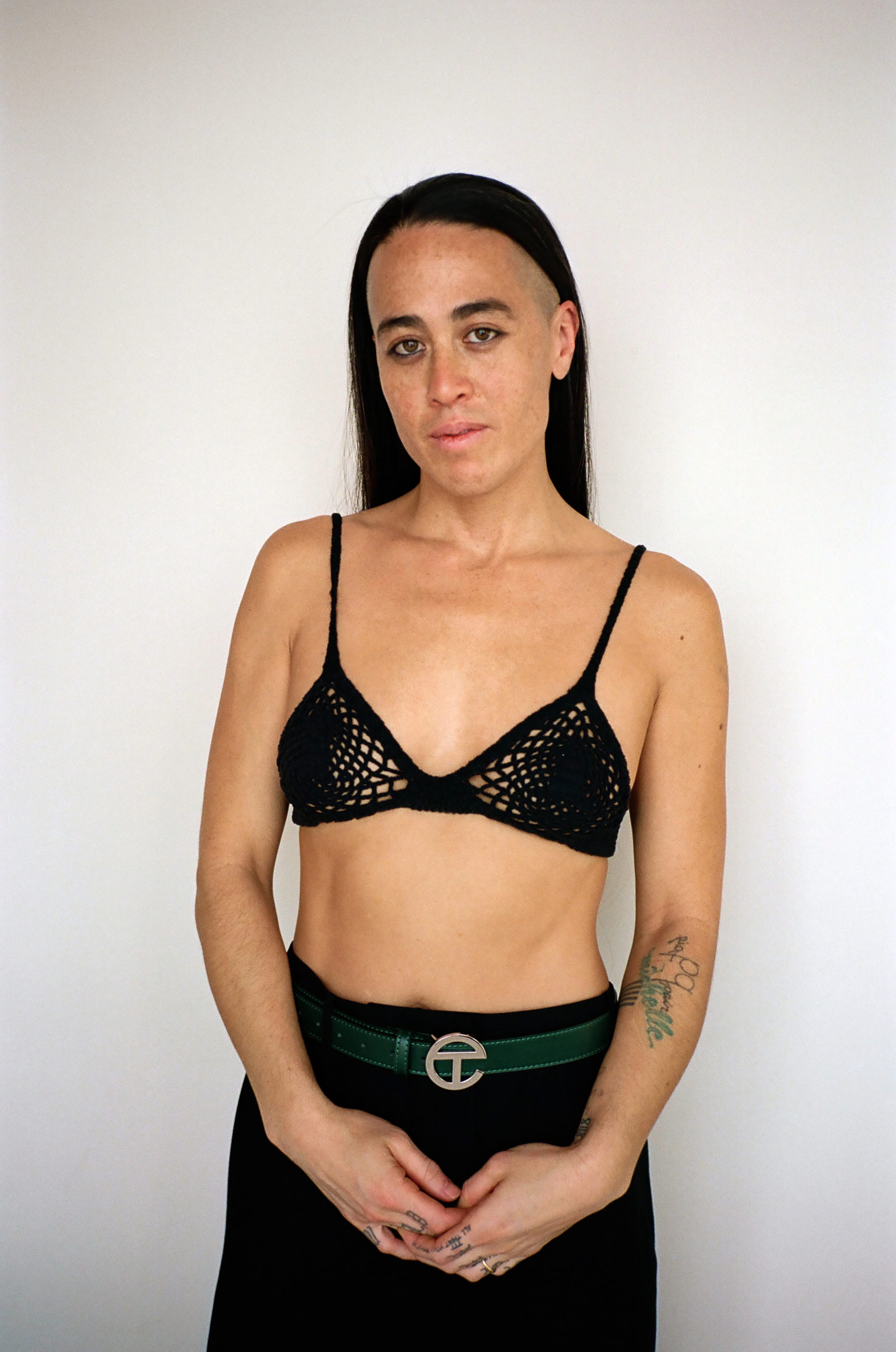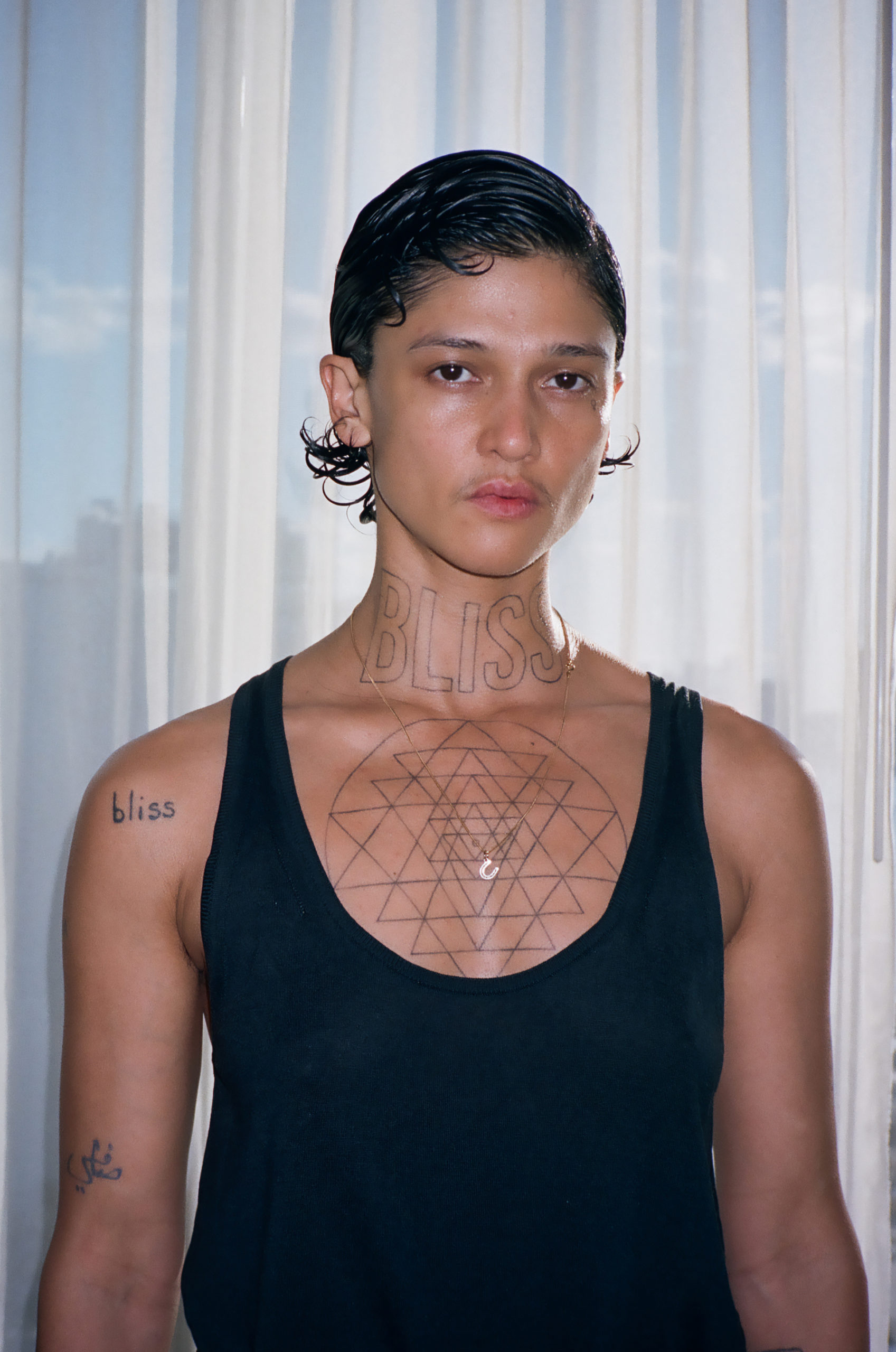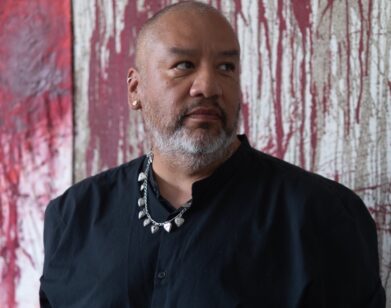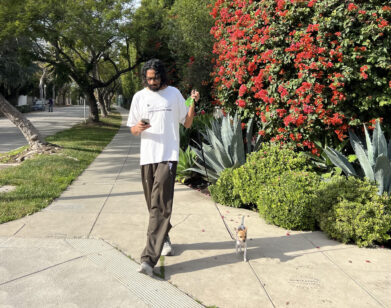film!
Wu Tsang and Tosh Basco on the White Whale in the Room
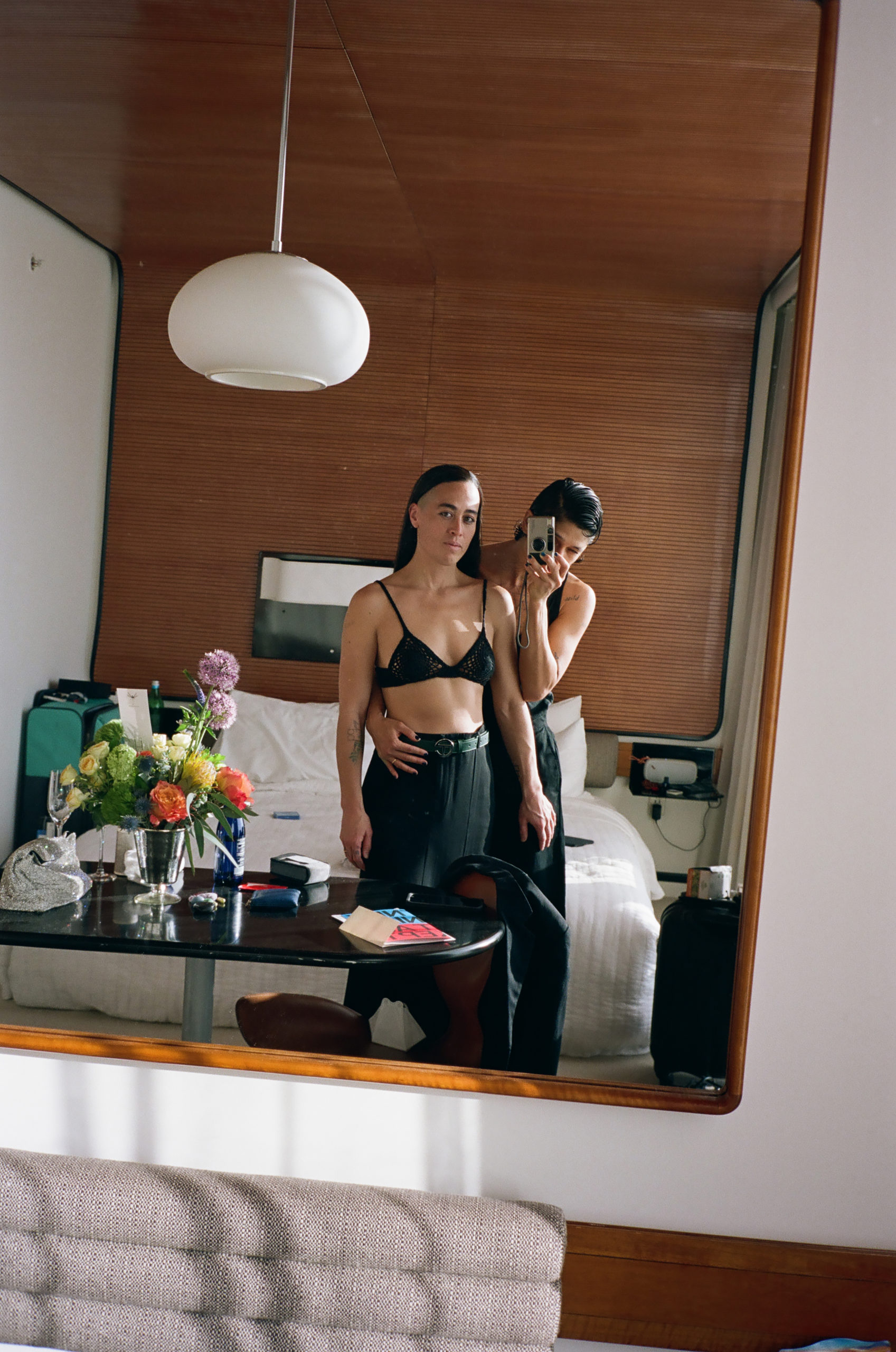
Photos courtesy of Wu Tsang and Tosh Basco
In an era relentlessly preoccupied with the film remake, the question of why this, why now? lurks. From Beauty and the Beast to The Batman, the revival of old worlds so often prevails over the creation of new ones. It is into this cultural landscape that Wu Tsang brings us MOBY DICK; or, The Whale. For the MacArthur “genius” grant-winning artist and filmmaker— whose work has appeared at the Tate Modern, the New Museum, and in the Whitney Biennial—the urge to resuscitate Herman Melville’s 19th century literary behemoth, and the white whale at its heart, was all but overpowering. While thumbing through the Moby-Dick, Tsang was captivated by the unspoken: Ishamel’s ardent love for his fellow shipmate, the horror and allure of the sperm whale’s whiteness, and the carefree pillaging of the earth’s natural resources. But Tsang’s is not your typical remake. The artist’s surrealist take on the canonical classic feels both foreign and familiar: a crew of queer whalers swab the decks in joyful unison, sleep tenderly in shared hammocks, and roll back the sleeves of their Telfar-designed costumes to extract armfuls of gold-flecked iridescent blubber from the open skulls of dead whales. The film, which premiered at the Venice Biennale’s Teatro Goldoni this week, and its North American debut at the Shed in New York the week prior, is a silent production scored by an accompanying live orchestra, making it equal parts live performance and cinematic experience. To learn more about MOBY DICK, Tsang sat down with her longtime friend and collaborator, Tosh Basco—who plays Ishmael’s companion, Queequeg, in the film—for a conversation about nightlife, dilapidated art forms, and white whales.
———
TOSH BASCO: How did we first encounter one another?
WU TSANG: I saw you perform at a club in L.A. called Mustache Mondays, I think it was 2012.
BASCO: 10 years. It feels so far away from the world that we live in now. I don’t know that I have an active relationship with nightlife anymore—but it is something that we carry with us in the way that we approach collaboration and our work.
TSANG: In what ways?
BASCO: Nightlife was always a way of being with other people, finding your people, celebrating with people. It’s about the drama, and the joy and the tribulations and the dancing. Sharing that feels important, and that was also very exciting for me as a performer, thinking about how to share performance beyond the “liveness.” That’s why I love working with you. You understand how to translate live performance in a meaningful way through video, not by trying to preserve or capture the liveness, but by communicating the magic and the essence of it through what video has to offer—as far as the surreal aspects, the possibilities.
TSANG: It’s cool you brought up nightlife—I think that it’s often a formative place for young queer people. Nightlife for me was a way to make family. Throwing parties was about creating spaces for people to gather, and creating atmospheres that we felt safe and free in, and energized by, and all that. I was documenting a lot of performances that would happen in the club and I wanted to tell stories that felt like my experience of being there. That created a bunch of filmmaking problems, because turning a camera on doesn’t do justice to the feeling of being in the club. This question of translation into film is something that I still carry with me. That’s one thing that I’ve really enjoyed about making films with you over the years—you’re a performer that works improvisationally. I can’t plan everything because I don’t know what you’re going to do. But, we can develop a language, which then extends to everybody we’re working with.
- Wu Tsang and Tosh Basco.
BASCO: Yeah, I learned how to extend that creative language to others through collaborating with you.
TSANG: I guess we should talk about Moby Dick. [Laughs]
BASCO: Well, I want to ask you: why Moby Dick?
TSANG: The idea of doing Moby Dick arose because our performance collective [Moved by the Motion] is in residence at a theater that runs shows in repertoire. I was trying to think of a way to hybridize our practice, so that it’s not just our bodies on stage over and over and over again. I was struck by the idea of a film with a live orchestra, because it combines performance and film. But why Moby Dick? Around that time, I saw a talk by our friend Laura Harris, who is a writer and scholar, about C.L.R. James’ book Mariners, Renegades, and Castaways. It’s a post-colonial reading of Moby Dick. She read this one passage from Moby Dick about squeezing the spermaceti [of the sperm whale], in this very beautiful, erotic and brilliant way that just opened up all these layered interpretations of the story. With every project we’ve done, there’s always a matrix that we are trying to tap into: something that’s familiar on the surface—a story most people know—then we peel back the layers and take it in new directions. Moby Dick felt juicy in that way. What did you think when I said I wanted to do it?
BASCO: It felt so perverse to take on the great American novel—which I actually had never read until now—especially while working in a German speaking theater. It was an unexpected direction for us to take compared to [James] Baldwin’s essay that we worked with last season, Stranger in the Village.
TSANG: I remembered Baldwin’s essay [Stranger in the Village] when we first moved to Switzerland, and it felt like an appropriate starting point for our group, as we were trying to make sense of settling into the place and our work at the theater. Maybe our displacement provoked us to reflect on our Americanness in a different way.
BASCO: As far as Moby Dick feels from my life, there’s a part of me, and of that story, that is deeply connected to the idea of America, of the U.S.
TSANG: How so?
BASCO: The construction of the world through an American historical lens. It’s interesting for us to work with narrative, because usually, we’re focused on highlighting the band, the improvisation, the gathering, the poem, things which are between and beyond language. But this feels like a very different approach—it’s really about this construction of worlds. How did you approach the writing?
TSANG: I worked with Sophia Al-Maria, who wrote the script—that was a key collaboration. In addition to being a genius artist in her own right, she brought her experience adapting historical fiction, and her own research on maritime history. I don’t usually use scripts, because in the past they felt constraining, but in this case, I knew we needed a script because it’s such a behemoth of a book, and we needed a map. I didn’t necessarily want to be faithful to the story, but I didn’t want to get lost in it, either. There are a lot of moments in this film where we’re winking at the act of storytelling. Sophia created all these opportunities within the script for us to wink. The set is obviously fake, it’s a virtual ocean, but we are heightening the aesthetic. The clothing is not period-accurate—Telfar [Clemens] made the clothes so dirty, with armpit stains. We’re playing with time and truth in a way that is really the product of our experience in America, as people who might not relate to the Great American novel. We’re not usually the heroes of these kinds of stories, and we’re not trying to claim that heroism. We’re not trying to fit into the canon. and I don’t even think we’re trying to dismantle it, because that would give it too much power. I don’t know where I’m going with this thought. But I get excited talking about it—there’s just so much excess! That’s the way that we make it ours.
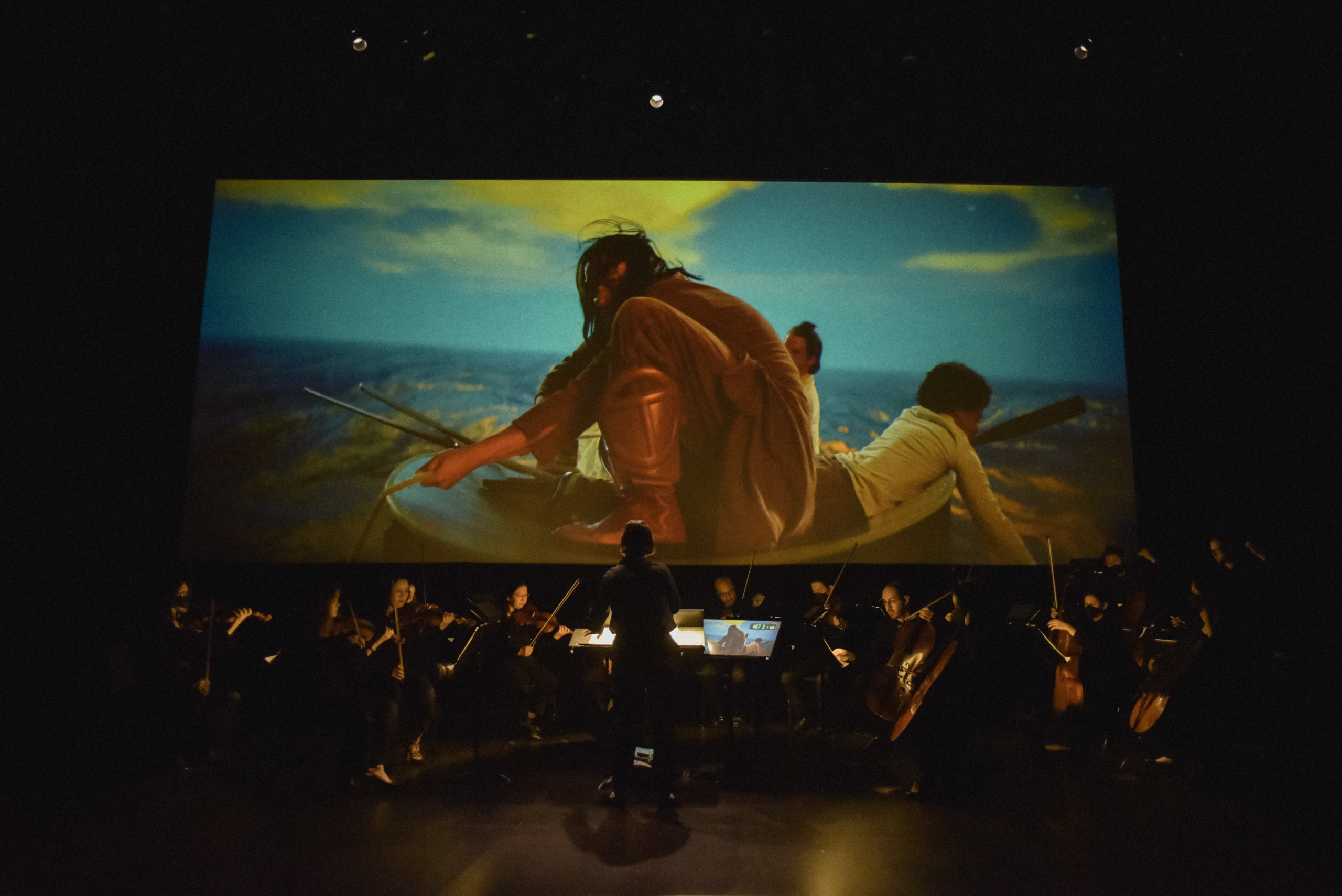
MOBY DICK; or, The Whale, 2022. Dir. Wu Tsang, prod. Schauspielhaus Zürich. With live accompaniment by Members of the New York Philharmonic, The Shed, New York, April 15 – 17, 2022. Photo: Cirsty Burton. Courtesy The Shed.
BASCO: That takes me back to the club. Before becoming a performer, as a young queer and trans person, I learned about performativity on the street. I learned the ways that perception shifts based on where you are and who you are, the flexibility of identity. The clothes, the lights, the accoutrements, the bedazzlements—when I say I carry the club with me, I think that’s what I’m talking about. You learn in those spaces how unfixed identity is.
TSANG: It’s making me think about the word drag, which really maybe makes me a granny, to use that term. There’s so much self-reflexivity built into how we talk about drag. You might say that you started as a performer by doing drag. It’s such an old word that maybe people don’t find it useful, but there are these strategies and aesthetic traditions that come out of drag that might not be recognized by the film world or the art world.
BASCO: Talking about grannies in the club, theater is the OG granny in the club. We don’t have the same relationship to theater in the US as people do in Europe, where it is state funded. When I think of theater, I think of propaganda. I think of rebellion. I think of quiet, revolutionary moments in history. In the U.S. we have Hollywood, we have Broadway, and we have performance art.
TSANG: It’s interesting to work in a German-speaking, state-funded theater at the moment, which historically played an important role in shaping national identity. A state theater is supposed to be a place that reflects the culture of its people. Although it has been dismantled and rehabilitated like all post-modern art forms, you can still feel the weightiness of that expectation, even in the disavowal of that expectation. Regardless, it feels like state theater is driven by a public mandate in a different way than, say, an American museum is. It was such a big deal in the city of Zurich, when the Schauspielhaus’s current artistic directors invited eight directors, including us. They were tasked with rethinking the theater, and they invited us to come think through that problem with them. Coming from the American context, where movies filled a similar role—at least in the 20th century of—reinforcing American culture, it’s interesting to be making movies in the theater. The theater’s production model and hierarchies are like the old Hollywood studio model—literally, I am an in-house “director” and you are an in-house “actor.”
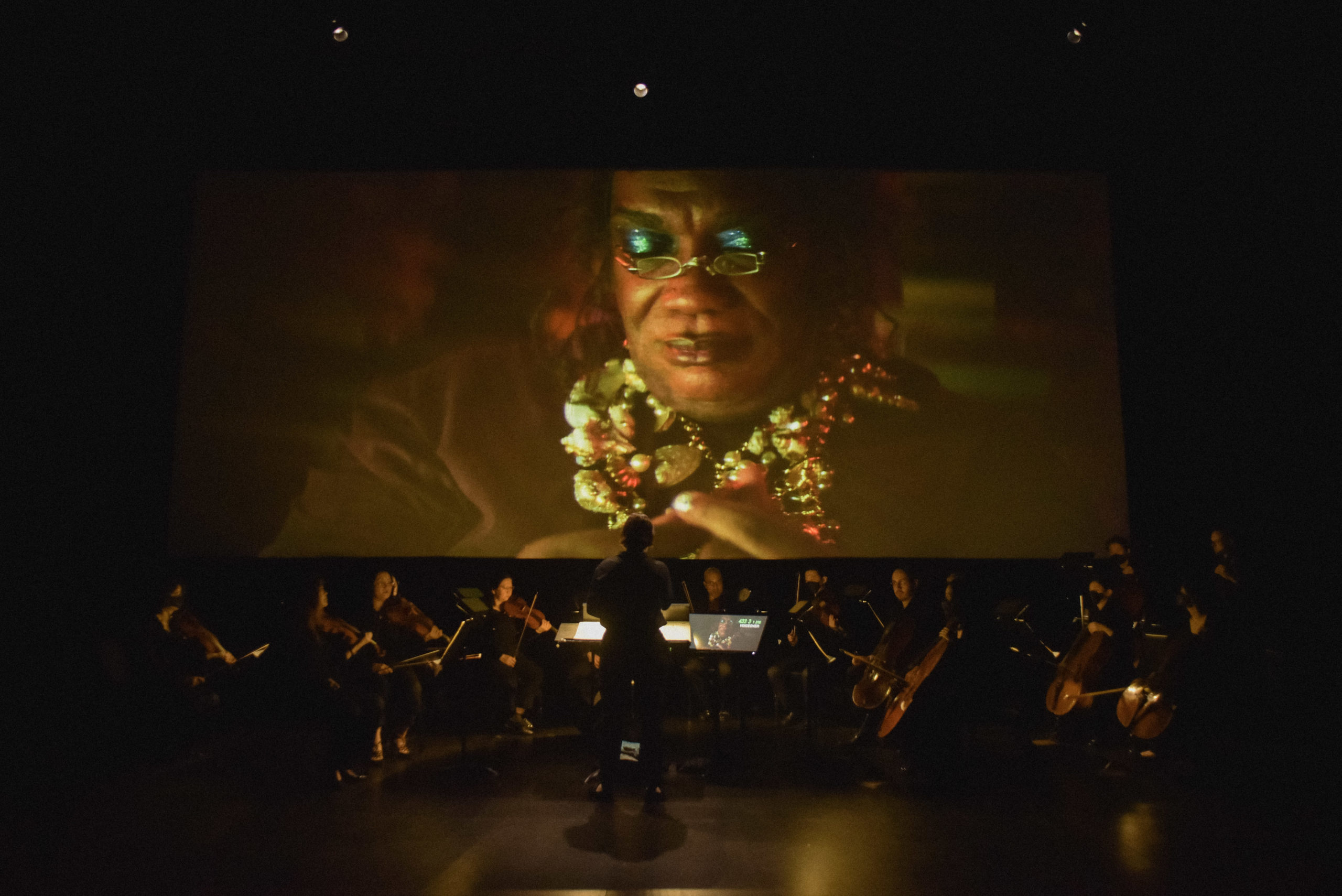
MOBY DICK; or, The Whale, 2022. Dir. Wu Tsang, prod. Schauspielhaus Zürich. With live accompaniment by Members of the New York Philharmonic, The Shed, New York, April 15 – 17, 2022. Photo: Cirsty Burton. Courtesy The Shed.
BASCO: Yeah, it does feel like there are multiple reflections in play: you have the novel, the theater, and Hollywood. They feel like dilapidated forms. Theater feels really outdated. Hollywood and movie theaters are shifting. And still, you went back to this old form of a silent film, and you made it in a theater.
TSANG: Right, like why? [Both laugh]
BASCO: Yes, why?
TSANG: I guess we all have our inclinations as artists, and I do often look to the past because I like to remember that everything has already been done, there is no original idea. Silent filmmakers in the ‘20s were crazy inventive with their visual story-telling styles because there weren’t such established creative rules then. Moby Dick was written more than 150 years ago, but the language is so old that it’s almost contemporary. Language, like fashion, can be so old it feels new, and takes on all these other meanings. They are both forms of communication and expression, so it’s inspiring to recontextualize them.
BASCO: Well, it’s making me think of something you said earlier. We’re not trying to dismantle it, and we are the ones historically who are erased.
TSANG: I do feel preoccupied with the world ending, which seems to be common at the moment with COVID and the possibility of another world war. Here is a silly, unanswerable question: are we living in a time that is different from what came before? This moment does feel like a rupture, I am reminded daily of all the ways we are exhausting our potential as a species, so I’m less interested in the question of “What will we do next?” and more interested in, “How did we get where we are?” Mody Dick, Melville’s writing, offers a lot of answers to those questions. The extraction of earth’s resources for energy and the pursuit of knowledge, of mapping, knowing, conquering. All of those things are in Moby Dick. It’s a key to understanding the destruction of the planet—not to get all doomsday about it. [Both laugh]
BASCO: I think it’s an interesting moment to resurrect this story. The main character’s fantasy is for a very diverse group of people to participate in that extraction.
TSANG: It’s funny, because the main character, Ishmael, is kinda Melville, right? Ishmael is a writer and he’s the only one who survives to tell the story. In real life, Melville deserted a whaling ship, and lived in the South Pacific in his own exotic fantasy, and was maybe gay—who knows—but clearly has these desires to be outside of his upper middle class, educated background. And art is how he finds that access. I think artists in general are somewhat plagued by that kind of access. Making art means you are exploiting your experience essentially, and I find that to be endlessly provoking. There is clearly some extraction that happens in that process, producing something that gives our life meaning. But that is problematic, in a good way. How was this experience for you?
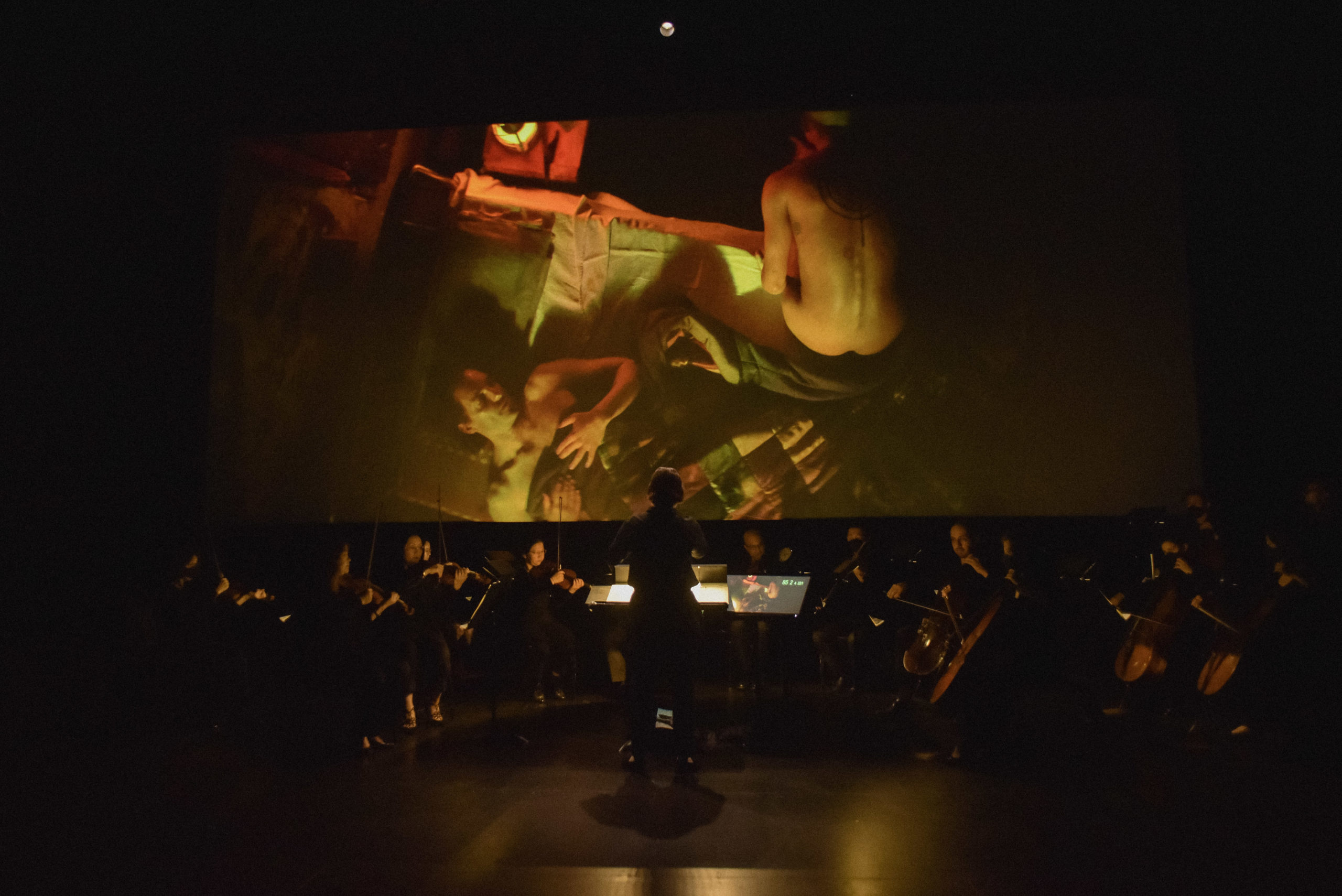
MOBY DICK; or, The Whale, 2022. Dir. Wu Tsang, prod. Schauspielhaus Zürich. With live accompaniment by Members of the New York Philharmonic, The Shed, New York, April 15 – 17, 2022. Photo: Cirsty Burton. Courtesy The Shed.
BASCO: Moby Dick is about the pursuit of this evasive elephant in the room, this enormous monstrosity, a demonic white whale. Everyone’s heard about it, but no one’s seen it. It’s a myth. Working on this has felt akin to that experience, like being on a ship in many ways. This kind of work is the artist’s plight—whether you are participating in your life or you’re translating it for other people, there has to be meaning-making. But documenting the experiences of people who are outside of the story has allowed for my survival. It’s really special to make meaning and have fun and get to make this really perverse reimagining of Moby Dick.
TSANG: And to be able to share it with the world.

